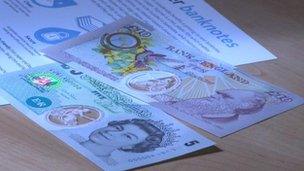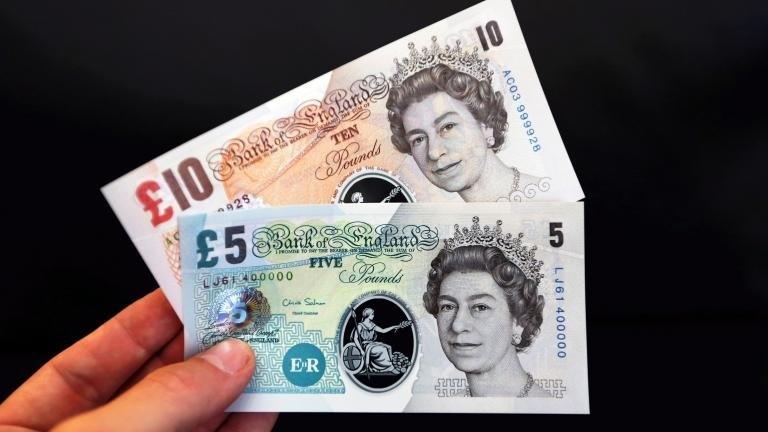Plastic money and how far will resources stretch?
- Published

The Bank of England has created some specimen polymer banknotes
Are you ready for plastic banknotes? Washable ones. They won't go any further when it comes to spending - but they might feel shiny and clean as you hand them over at the supermarket checkout.
However, today's controversy in Scotland centres more upon the elasticity of our financial resources. More specifically, the strain which the Treasury asserts would be placed upon Scotland's budget by promises contained in the independence White Paper.
According to Danny Alexander, the chief secretary to the Treasury, Scotland would need to find an extra £1.6bn per annum to pay for those pledges: such as enhancing childcare, cutting corporation tax and halving Air Passenger Duty.
This analysis is disputed by Nicola Sturgeon, the deputy first minister. She says it takes minimal account of the spending cuts planned by the Scottish government, including the abandonment of Trident.
And she argues further that the Treasury counting takes no notice of the gains which would accrue: for example, the tax take from parents' freed to return to work by improved childcare.
Mr Alexander says that those gains would be down the road - while the costs of the policy would have to be faced upfront. He argues that there are further costs in the White Paper which are difficult to quantify, such as the renationalisation of Royal Mail in Scotland.
Ms Sturgeon says she has heard it all before - and that the figures appear to vary wildly. It is, she says, mere scare-mongering.
Danny Alexander retorts that the other figures out there reflect structural gaps in the existing Scottish budget. The new figure deals solely with the costs of WP promises.
To which, Ms Sturgeon replies that the Treasury have landed Scotland in the glaur in the first place by misusing oil revenues, that Scotland (with oil) has been a net contributor to the UK for decades - and that Scotland would thrive, with growth funding policies.
To which...
Barnett formula
Another economic topic today in the shape of a letter from the prime minister to the first minister. The FM had wanted the PM to offer a guarantee as to the future of the Barnett Formula which governs Scottish spending (or, more precisely, the annual change in Scottish spending by comparison with comparable Whitehall budgets.)
The PM reckoned that demand was "quite astonishing". He replied to the FM that he could "no more bind future UK governments than you can bind future Scottish governments." Nevertheless, he insisted that "reform of the Barnett formula is not on the horizon".
Ms Sturgeon found this less than reassuring, arguing that the horizon might lessen in remoteness should there be a No vote in the referendum.
She noted that she and her fellow Yes campaigners were constrained to provide guarantees on any and every thing - while the PM apparently declined to follow suit with regard to the medium or long term future of Scottish expenditure.
No, no, say the UK government. The PM is merely stating constitutional reality. We should heed instead the PM's point that "the only immediate threat to Scotland's funding is a vote for independence."
To which...
- Published18 December 2013
